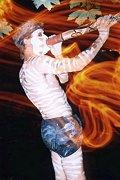Steve Wright has been playing and through demand, teaching didjeridu for the last ten years. He is currently residing in East Yorkshire, England, and he is, among other things, founder of the Hull & District Didjeridu Club which holds meetings the last Friday of every month at Marist Social Club, Cottingham Rd Hull. He is also a UK Importer of Aboriginal Art, Didjeridu's , painted original canvases and Boomerangs. He presents regular Workshops for Schools, has mobile displays and stalls, as well as giving Didjeridu Tuition, College Nightclasses, Performances, Boomerang throwing workshops, Exhibitions and displays of traditional items like Killer Boomerangs, Woven Baskets, Emu callers, Hand Carved Wooden No 7 Boomerangs (made by 80 yr old Fred Blitner) and Hunting Spearsto all age groups
Steve has recently built a MSN Group Didjeridu website which has a steadily growing community of members at
http://groups.msn.com/INDIDGINUSDOOSSteve recently completed a six month partnership with business development company, InBiz (HULL) and during this time appeared on the BBC news programme, look north and both BBC Radio Humberside breakfast show and The Raw talent show hosted by Alan Rowe where Several tracks from the CD The road to Wugularr were played.
He has attended a great number of Workshops himself over the years, with virtuoso players including:-Alan Dargin (Australia)
Phillip Conyngham (Australia)
Shozo (Japan)
Stephen Kent (America)
Michael jackson (Aus,)
Mark Atkins.(Aus)
Charlie McMahon(Aus)Steve has travelled extensively and he has spent time with the indigenous peoples of the Kalahari Desert (Sen bushmen) and also with the Iban people of the South East Asian rainforest. He has also recently completed a trip to Australia where he visited with some of the communities Western Arnhem Land and north central Arnhem Land from whom he has recieved didjeridu's and much advice in the past.
he has performed at various festivals and venues both solo and with various bands including CELTARABIA(see friends) with whom he has some more gigs this october(2007). He has recorded a C.D "THE ROAD TO WUGULARR", with Nick Burman and recently has been working more and more with Mervyn Firebrace, and his world famous father Frances Firebrace. Mervyn is an Aboriginal storyteller, a dancer and a Didjeridu player, whose origins are from the Yorta Yorta people. Steve also works in Portugal with a fellow didgeridoo player Diogo who accompanied Steve on his trip to Australia in Nov 2006 where they visited the communities of Wugularr (W,Arnhem land) and Maningrida (N. Arnhem land).
A note forom Steve
" Many Didjeridu's imported into this country are cheap imitations or are cut illegaly. They seldom look or sound anything like as good as authentic termite hollowed versions made in the traditional manner by licenced Aboriginal didjeridu makers.
Didjeridu's or Yidaki (one of many Aboriginal names for the instrument) are all one off pieces. Each instrument is unique in sound and appearance.
I offer any advice I can to people wanting to purchase an instrument as well as teaching how to play our style (Traditional Styles take much longer and are best taught by the traditional owners of the style you wish to learn ie Western arnhem land , North East Arnhem land.) Steve has also produced a learn to play guide in two levels which is designed to give the student all the necessary components needed to begin a long and enjoyable Didjeridu -playing adventure.
"To obtain the most effective results, the course is designed to be taught and supervised by an experienced didjeridu player who will be able to explain all the various techniques in detail as the student progresses through levels one and two and hopefully, on to level three. Which is the advanced level.
The books however, are also a valuable guide to students and can be constantly referred to as an aid to unsupervised practice. The guides enable me to pass on some of the techniques I have learned from some of the worlds best players "." I am lucky enough to have received didjeridu's from a village in the Northern Territory called Wugularr. Here the didjeridu's are made and decorated in the traditional way, the way they have been for many thousands of years.
The didjeridu is indeed, a captivating instrument ".
